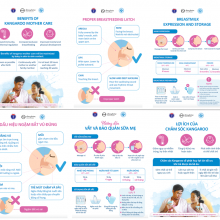Journal article
Feb 07 2023

The political economy of infant and young child feeding: confronting corporate power, overcoming structural barriers, and accelerating progress (Baker P, Smith JP, et al, The Lancet. 2023)
Despite increasing evidence about the value and importance of breastfeeding, less than half of the world's infants and young children (aged 0–36 months) are breastfed as recommended. This Series paper examines the social, political, and economic reasons for this problem.
Journal article
Jan 13 2023

Differences in the Microbiological Profile of Raw and Pasteurized Breastmilk from Hospital and Community-Based Donors at the First Human Milk Bank in Vietnam (Tran HT, Nguyen TT, et al, Nutrients. 2023)
Microbiological quality is one of the key safety standards in human milk bank operations.
Journal article
Jan 10 2023

The Financial Costs of Mass Media Interventions Used for Improving Breastfeeding Practices in Bangladesh, Burkina Faso, Nigeria, and Vietnam (Sanghvi T.G., et al, 2022)
This analysis documents the financial costs and budgetary needs for implementing mass media components of large-scale breastfeeding programs, providing annual costs, cost structures, and coverage achieved through mass media interventions in four low- and middle-income countries.
Poster/Graphic
Mar 10 2022

Educational posters on Kangaroo Mother Care, Proper Latching, and Breastmilk Expression and Storage
This series of three posters, developed in collaboration with the Ministry of Health of Viet Nam, provides information on kangaroo mother care, proper breastfeeding latch, and breastmilk expression and storage.
Journal article
Aug 22 2021

Implementation of the Code of Marketing of Breast-Milk Substitutes in Vietnam: Marketing Practices by the Industry and Perceptions of Caregivers and Health Workers (Nutrients, 2021)
This study examined implementation of the Code of Marketing of Breast-Milk Substitutes (the Code) in Vietnam with a focus on marketing practices by the baby food industry and perceptions of caregivers, health workers, and policy makers.
Journal article
Dec 08 2020

The financing need for expanding paid maternity leave to support breastfeeding in the informal sector in the Philippines (Ulep, V., 2020. Maternal & Child Nutrition)
In the Philippines, workers in the informal economy are not guaranteed paid maternity leave. A non‐contributory maternity cash transfer to informal sector workers could improve social equity, economic productivity, and public health and nutrition through supporting breastfeeding.

